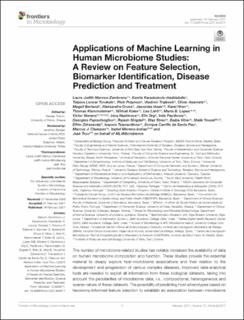| dc.contributor.author | Marcos-Zambrano, Laura Judith | |
| dc.contributor.author | Hadziabdic, Kanita Karaduzovic | |
| dc.contributor.author | Turukalo, Tatjana Loncar | |
| dc.contributor.author | Przymus, Piotr | |
| dc.contributor.author | Trajkovik, Vladimir | |
| dc.contributor.author | Aasmets, Oliver | |
| dc.contributor.author | Berland, Magali | |
| dc.contributor.author | Gruca, Aleksandra | |
| dc.contributor.author | Hasic, Jasminka | |
| dc.contributor.author | Hron, Karel | |
| dc.contributor.author | Klammsteiner, Thomas | |
| dc.contributor.author | Kolev, Mikhail | |
| dc.contributor.author | Lahti, Leo | |
| dc.contributor.author | Lopes, Marta B. | |
| dc.contributor.author | Moreno, Victor | |
| dc.contributor.author | Naskinova, Irina | |
| dc.contributor.author | Org, Elin | |
| dc.contributor.author | Paciencia, Ines | |
| dc.contributor.author | Papoutsoglou, Georgios | |
| dc.contributor.author | Shigdel, Rajesh | |
| dc.contributor.author | Stres, Blaz | |
| dc.contributor.author | Vilne, Baiba | |
| dc.contributor.author | Yousef, Malik | |
| dc.contributor.author | Zdravevski, Eftim | |
| dc.contributor.author | Tsamardinos, Ioannis | |
| dc.contributor.author | Carrillo de Santa Pau, Enrique | |
| dc.contributor.author | Claesson, Marcus J. | |
| dc.contributor.author | Moreno-Indias, Isabel | |
| dc.contributor.author | Truu, Jaak | |
| dc.date.accessioned | 2022-04-19T08:55:33Z | |
| dc.date.available | 2022-04-19T08:55:33Z | |
| dc.date.created | 2021-03-14T00:04:50Z | |
| dc.date.issued | 2021 | |
| dc.identifier.issn | 1664-302X | |
| dc.identifier.uri | https://hdl.handle.net/11250/2991252 | |
| dc.description.abstract | The number of microbiome-related studies has notably increased the availability of data on human microbiome composition and function. These studies provide the essential material to deeply explore host-microbiome associations and their relation to the development and progression of various complex diseases. Improved data-analytical tools are needed to exploit all information from these biological datasets, taking into account the peculiarities of microbiome data, i.e., compositional, heterogeneous and sparse nature of these datasets. The possibility of predicting host-phenotypes based on taxonomy-informed feature selection to establish an association between microbiome and predict disease states is beneficial for personalized medicine. In this regard, machine learning (ML) provides new insights into the development of models that can be used to predict outputs, such as classification and prediction in microbiology, infer host phenotypes to predict diseases and use microbial communities to stratify patients by their characterization of state-specific microbial signatures. Here we review the state-of-the-art ML methods and respective software applied in human microbiome studies, performed as part of the COST Action ML4Microbiome activities. This scoping review focuses on the application of ML in microbiome studies related to association and clinical use for diagnostics, prognostics, and therapeutics. Although the data presented here is more related to the bacterial community, many algorithms could be applied in general, regardless of the feature type. This literature and software review covering this broad topic is aligned with the scoping review methodology. The manual identification of data sources has been complemented with: (1) automated publication search through digital libraries of the three major publishers using natural language processing (NLP) Toolkit, and (2) an automated identification of relevant software repositories on GitHub and ranking of the related research papers relying on learning to rank approach. | en_US |
| dc.language.iso | eng | en_US |
| dc.publisher | Frontiers Media | en_US |
| dc.rights | Navngivelse 4.0 Internasjonal | * |
| dc.rights.uri | http://creativecommons.org/licenses/by/4.0/deed.no | * |
| dc.title | Applications of Machine Learning in Human Microbiome Studies: A Review on Feature Selection, Biomarker Identification, Disease Prediction and Treatment | en_US |
| dc.type | Journal article | en_US |
| dc.type | Peer reviewed | en_US |
| dc.description.version | publishedVersion | en_US |
| dc.rights.holder | Copyright 2021 Marcos-Zambrano, Karaduzovic-Hadziabdic, Loncar Turukalo, Przymus, Trajkovik, Aasmets, Berland, Gruca, Hasic, Hron, Klammsteiner, Kolev, Lahti, Lopes, Moreno, Naskinova, Org, Paciência, Papoutsoglou, Shigdel, Stres, Vilne, Yousef, Zdravevski, Tsamardinos, Carrillo de Santa Pau, Claesson, Moreno-Indias and Truu | en_US |
| dc.source.articlenumber | 634511 | en_US |
| cristin.ispublished | true | |
| cristin.fulltext | original | |
| cristin.qualitycode | 2 | |
| dc.identifier.doi | 10.3389/fmicb.2021.634511 | |
| dc.identifier.cristin | 1897896 | |
| dc.source.journal | Frontiers in Microbiology | en_US |
| dc.identifier.citation | Frontiers in Microbiology. 2021, 12, 634511. | en_US |
| dc.source.volume | 12 | en_US |

